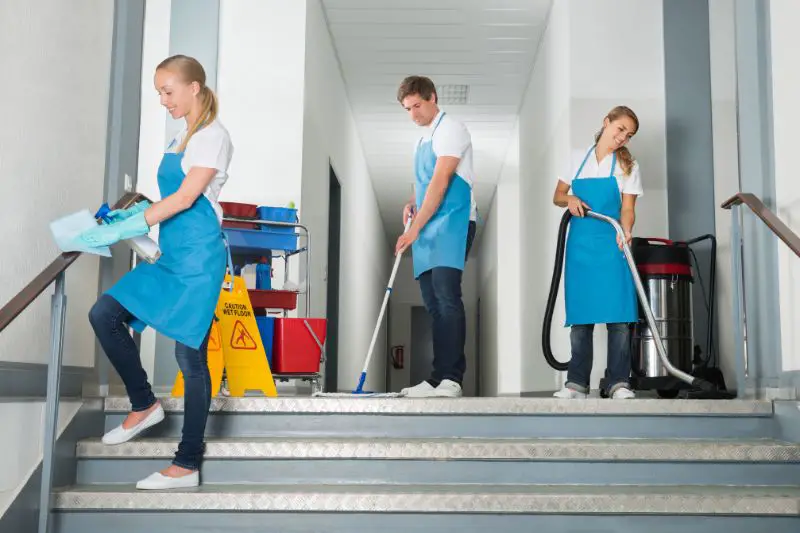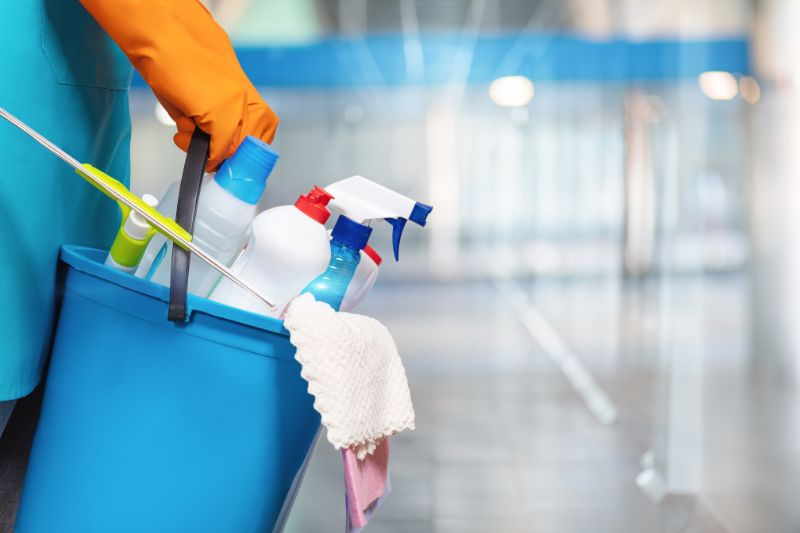
Have you ever wondered why some cleaning businesses thrive while others struggle to find clients? The secret isn’t just in the quality of service—it’s in knowing exactly who to serve. Finding the right target market for your cleaning services can mean the difference between a business that barely gets by and one that consistently attracts loyal customers.
Whether you’re focusing on residential homes, bustling office spaces, or specialized cleaning niches, understanding your ideal client is the key to effective marketing and sustainable growth. In this guide, we’ll uncover the different target markets for cleaning services, how to identify the best fit for your business, and the strategies to reach them. Let’s dive in!
Why Identifying Your Target Market Matters

Understanding your target market is essential for building a successful cleaning business. Without a clear grasp of who your ideal customers are, your marketing efforts can become scattered and ineffective. By identifying the right audience, you can tailor your services, pricing, and promotions to attract and retain clients more efficiently.
Increased Marketing Efficiency
When you know who your ideal customers are, you can create marketing campaigns that speak directly to their needs and preferences. Instead of a one-size-fits-all approach, you can develop targeted messaging that resonates with the right people. For example:
- A cleaning company targeting busy professionals might emphasize time-saving services.
- A business specializing in eco-friendly cleaning can highlight its use of non-toxic products to attract health-conscious families.
- Commercial cleaning services can showcase their ability to maintain a professional work environment for corporate clients.
By refining your marketing efforts, you can reduce wasted advertising spend and achieve a higher return on investment.
Stronger Customer Relationships
When you focus on a well-defined market, you can better understand your customers’ pain points and expectations. This allows you to deliver personalized service, leading to higher customer satisfaction and long-term loyalty. For instance, homeowners looking for regular cleaning may value consistency and reliability, while real estate agents may need fast, high-quality turnover cleaning for property showings.
Understanding your market also helps you anticipate future needs, such as offering add-on services like deep cleaning or organization assistance. The more you align with your customers’ specific concerns, the more likely they are to recommend your business to others.
Competitive Advantage
A well-defined target market gives you an edge over competitors who take a generalist approach. By positioning your cleaning business as a specialist in a specific niche, you can stand out and become the go-to service provider for that segment.
For example, if you focus on post-construction cleaning, you can market directly to contractors and property developers who require thorough cleanups after building projects. If your expertise is in medical facility cleaning, emphasizing compliance with health regulations and sanitation standards can set you apart from standard janitorial services.
Instead of trying to appeal to everyone, narrowing your focus allows you to dominate a specific area of the market and build a reputation as an expert in your field.
Key Factors in Defining Your Target Market

Identifying the right target market for your cleaning services requires a strategic approach. Instead of casting a wide net, focus on specific characteristics that define your ideal customers. By understanding their demographics, behaviors, and needs, you can tailor your services and marketing to attract the right clients.
Demographics: Who Are Your Ideal Clients?
Demographics play a crucial role in defining your target audience. Consider factors such as:
- Age and Lifestyle: Young professionals may seek convenience and efficiency, while elderly clients might require specialized assistance.
- Income Level: High-income households may prioritize luxury services, while budget-conscious customers might look for cost-effective options.
- Family Structure: Busy families with children may need frequent cleaning to maintain a tidy home.
- Business Size (for commercial services): Large corporate offices require different cleaning solutions than small retail shops.
By analyzing these factors, you can refine your service offerings and pricing to match your target clients’ expectations.
Psychographics: What Motivates Your Clients?
Psychographics go beyond basic demographics to explore your audience’s attitudes, values, and pain points. Understanding these insights can help you position your cleaning services more effectively.
- Health-conscious consumers may be drawn to eco-friendly cleaning products and non-toxic solutions.
- Busy professionals might prioritize reliability and efficiency over cost.
- Business owners could value after-hours cleaning services to avoid disruptions.
By identifying what drives your customers’ decisions, you can craft compelling marketing messages that resonate with their priorities.
Location: Where Are Your Customers?
The geographical area you serve significantly impacts your target market. Consider:
- Urban vs. Suburban Demand: City dwellers often seek apartment cleaning services, while suburban homeowners may need larger-scale cleaning.
- Affluent Neighborhoods: High-income areas may be more willing to pay premium rates for high-end services.
- Commercial Hotspots: Office districts, shopping centers, and medical hubs present opportunities for commercial cleaning contracts.
Analyzing local demand ensures you’re targeting the right areas with the highest potential for growth.
Primary Target Markets for Cleaning Services

The cleaning industry serves a wide variety of clients, each with unique needs, expectations, and pain points. Defining your target market not only helps you refine your services but also allows you to develop strategic marketing campaigns that speak directly to potential customers. Below, we break down the primary target markets for cleaning services and what each segment values most.
Residential Cleaning Services
Homeowners and renters form a significant portion of the cleaning services market. Their primary motivations often revolve around saving time, maintaining a healthy home environment, and ensuring a consistent level of cleanliness.
Busy Professionals and Families
Time constraints are a major pain point for professionals and families juggling work, school, and other responsibilities. They often seek:
- Regular cleaning schedules (weekly, bi-weekly, or monthly)
- Deep cleaning for special occasions or seasonal needs
- Time-saving solutions such as laundry, dishwashing, or organizational add-ons
These clients prioritize reliability and efficiency. A well-structured scheduling system and clear communication about services can set your business apart.
Seniors and Individuals with Disabilities
Older adults and individuals with mobility challenges often require assistance with household chores. They may look for:
- Gentle, detail-oriented cleaning approaches
- Assistance with difficult tasks, such as high dusting and deep scrubbing
- A consistent, trustworthy cleaning professional who provides peace of mind
For this audience, trust and compassion are as important as the quality of cleaning. Offering flexible scheduling and personalized services can help you establish strong, long-term relationships.
Luxury Homeowners
Affluent homeowners expect more than just standard cleaning—they seek premium services that align with their lifestyle. This market values:
- White-glove service and attention to detail
- Use of eco-friendly and high-end cleaning products
- Staff trained in working discreetly within luxury homes
Targeting this audience requires positioning your business as a high-end provider, emphasizing quality, exclusivity, and personalized services.
Short-Term Rental Owners (Airbnb & Vacation Homes)
With the rise of Airbnb and other short-term rental platforms, hosts require fast, high-quality turnover cleaning to maintain excellent guest reviews. Key services include:
- Same-day cleaning with flexible scheduling
- Restocking essentials (toiletries, linens, and kitchen supplies)
- Deep sanitation between guest stays
Many hosts seek a cleaning service they can rely on long-term. Providing check-in/check-out reports or offering bundled services can enhance your appeal.
Commercial Cleaning Services
Businesses require professional cleaning to maintain a safe, appealing, and productive environment. Unlike residential cleaning, commercial contracts often involve recurring services, making them a stable and lucrative market.
Office Buildings and Corporate Spaces
A clean workspace boosts employee productivity and enhances a company’s professional image. Businesses typically look for:
- Nighttime or after-hours cleaning to minimize disruption
- Consistent maintenance of high-traffic areas such as lobbies and restrooms
- Confidentiality and security when handling corporate spaces
Winning office cleaning contracts often requires showcasing reliability, flexibility, and compliance with workplace safety standards.
Retail Stores and Shopping Centers
Retail businesses rely on cleanliness to enhance customer experience and increase foot traffic. Essential services include:
- Frequent floor and window cleaning to maintain a welcoming storefront
- Restroom sanitation to meet hygiene expectations
- Trash removal and organization of store areas
Because retail cleaning often requires working outside of business hours, demonstrating a flexible, responsive service is key.
Restaurants and Hospitality Businesses
The hospitality industry is highly regulated, making cleanliness a top priority for customer satisfaction and compliance with health codes. Restaurants, hotels, and event venues require:
- Deep kitchen sanitation and grease removal
- Guest room and linen cleaning for hotels and resorts
- Regular inspections to meet health department requirements
Businesses in this sector prioritize efficiency, hygiene, and consistency, making professional, specialized cleaning services a necessity.
Medical Facilities and Healthcare Providers
Hospitals, clinics, and dental offices require cleaning services that go beyond aesthetics—they need strict sanitation protocols to prevent infections and cross-contamination. These clients seek:
- Disinfection of high-touch areas
- Adherence to healthcare industry cleaning standards (e.g., OSHA, CDC guidelines)
- Use of hospital-grade disinfectants and specialized equipment
Because healthcare facilities require the highest levels of hygiene, demonstrating expertise in sanitation and regulatory compliance is crucial for winning contracts.
Specialized Cleaning Services
Beyond general residential and commercial cleaning, specialized cleaning services cater to niche markets that require unique expertise. These services often command higher rates due to their complexity and demand.
Post-Construction Cleaning
Contractors and developers need thorough cleaning after construction projects to remove debris, dust, and hazardous materials. This type of cleaning requires:
- Heavy-duty equipment for debris removal
- Detailed cleaning of fixtures, walls, and floors
- Adherence to safety protocols to handle post-construction waste
Targeting builders, architects, and real estate developers can open doors to high-paying, recurring contracts.
Move-In/Move-Out Cleaning
Real estate agents, landlords, and property managers require deep cleaning services to prepare homes for new tenants or buyers. This niche market demands:
- Fast turnaround times to minimize vacancies
- Detailed deep cleaning, including carpets and appliances
- Flexible scheduling for last-minute bookings
Providing package deals for real estate firms or property management companies can secure repeat business.
Industrial and Warehouse Cleaning
Factories, warehouses, and manufacturing plants require specialized cleaning to maintain worker safety and comply with industry regulations. Services often include:
- Removal of industrial residues and hazardous waste
- Cleaning of large-scale machinery and equipment
- Floor scrubbing and spill management
This market requires trained staff familiar with safety protocols and industrial cleaning equipment, making it a profitable yet demanding niche.
Choosing the Right Market for Your Business
Each target market has unique challenges and opportunities. The best approach is to assess:
- Your expertise and resources – Do you have the skills and equipment required for specialized services?
- Market demand in your location – Is there a strong need for residential, commercial, or niche cleaning in your area?
- Competition and pricing – Can you differentiate your business in a crowded market?
By selecting a target market that aligns with your strengths and local demand, you can build a sustainable, profitable cleaning business that attracts loyal customers and long-term contracts.
How to Identify the Best Target Market for Your Cleaning Business

Selecting the right target market is essential for maximizing growth and profitability. Instead of trying to serve everyone, a focused approach allows you to build expertise, streamline operations, and develop a strong brand presence. The following steps will help you identify and refine the best market for your cleaning services.
Analyze Local Market Demand
Understanding the demand for cleaning services in your area is crucial. Research your local market to determine which segments have the highest need and willingness to pay. Consider:
- Population Density – Urban areas may have higher demand for apartment and office cleaning, while suburban regions may favor residential and post-construction cleaning.
- Economic Factors – High-income neighborhoods often seek premium cleaning services, whereas middle-income areas may prioritize affordability.
- Business Concentration – A strong commercial presence, such as office parks, medical centers, or retail hubs, indicates opportunities for commercial cleaning services.
Use online tools like Google Trends, local business directories, and community surveys to gather insights about market demand.
Evaluate Your Competition
Assessing your competitors helps you understand which services are in demand and where potential gaps exist. Conduct a competitor analysis by:
- Identifying leading cleaning companies in your area and reviewing their service offerings, pricing, and customer reviews.
- Checking their online presence to see how they market their business and what customer pain points they address.
- Looking for underserved niches—if many companies focus on residential cleaning, there may be an opportunity in post-construction or industrial cleaning.
If the market is highly saturated, consider offering a unique value proposition, such as eco-friendly cleaning, flexible scheduling, or specialized disinfection services.
Assess Your Business Strengths
Your target market should align with your business’s strengths, resources, and expertise. Consider:
- Experience and Training – Do you or your staff have specialized knowledge, such as hospital-grade sanitation or industrial cleaning techniques?
- Equipment and Supplies – Do you have the necessary tools for deep cleaning, floor polishing, or high-rise window cleaning?
- Team Capacity – Can your workforce handle large-scale commercial contracts, or is a more manageable residential focus better suited to your current structure?
Matching your market choice with your capabilities ensures you can deliver high-quality services consistently.
Define Your Ideal Customer Profile
Once you understand market demand, competition, and your strengths, refine your ideal customer profile. Consider:
- Demographics – Age, income level, household size, or business type.
- Psychographics – Values, lifestyle, and key concerns (e.g., time-saving solutions, green cleaning, or affordability).
- Behavioral Factors – Frequency of cleaning needs, willingness to commit to recurring services, and preferred communication channels.
For example, if you target busy professionals, emphasize efficiency and convenience. If you focus on medical facilities, highlight compliance with sanitation regulations.
Test and Refine Your Approach
Before fully committing to a market, test your strategy with pilot services, promotions, or outreach efforts. Effective testing methods include:
- Running a targeted ad campaign to see which customer segments respond most actively.
- Offering a limited-time discount to gauge interest in new service areas.
- Networking with industry professionals (e.g., realtors, contractors, or business owners) to identify potential partnerships.
Analyze the results, refine your messaging, and adjust your focus based on real-world customer responses. Over time, this data-driven approach will help you build a strong foundation for long-term success.
Strategies for Reaching Your Target Market

Once you’ve identified your ideal market, the next step is developing a strategy to effectively reach and engage potential customers. A strong marketing approach ensures your cleaning business stands out from competitors and attracts the right clientele.
Build a Strong Online Presence
In today’s digital landscape, most customers search for cleaning services online. A professional and well-optimized online presence increases visibility and credibility.
Create a User-Friendly Website
Your website serves as the foundation of your online marketing efforts. It should be:
- Easy to navigate with clear service descriptions and pricing (if applicable).
- Mobile-friendly to accommodate users searching from smartphones and tablets.
- Optimized for local SEO, including location-based keywords such as “office cleaning in [city]” or “residential cleaning near me.”
Consider adding customer testimonials, before-and-after images, and a simple booking system to improve conversions.
Leverage Social Media Marketing
Platforms like Facebook, Instagram, and LinkedIn allow you to showcase your expertise and engage with potential clients. Key strategies include:
- Sharing cleaning tips and educational content to position yourself as an industry expert.
- Posting customer success stories and client reviews to build trust.
- Running targeted ads to reach specific demographics based on location, interests, and behaviors.
For commercial cleaning, LinkedIn is particularly valuable for connecting with business owners and property managers.
Implement Local Marketing Strategies
While online marketing is crucial, local efforts help establish trust within your community and attract nearby customers.
Optimize Your Google Business Profile
A well-maintained Google Business Profile increases your chances of appearing in local search results. Ensure your profile includes:
- A detailed business description with relevant keywords.
- Updated contact information, service areas, and operating hours.
- High-quality images and customer reviews.
Encourage satisfied clients to leave reviews, as positive ratings improve credibility and local search rankings.
Network with Local Businesses and Organizations
Forming relationships with other businesses can lead to valuable referrals. Consider:
- Partnering with real estate agents, property managers, and contractors who regularly need cleaning services.
- Joining local business groups and networking events to connect with potential clients.
- Offering special deals to first-time customers to encourage word-of-mouth recommendations.
Referral partnerships can provide a steady stream of clients without high marketing costs.
Utilize Paid Advertising and Promotions
For faster results, paid advertising can help you reach your target audience effectively.
Run Targeted Pay-Per-Click (PPC) Campaigns
Google Ads and Facebook Ads allow you to advertise directly to potential clients searching for cleaning services. Effective PPC strategies include:
- Targeting location-specific keywords to attract local clients.
- Using compelling ad copy that highlights unique selling points (e.g., “Same-day deep cleaning – Book now!”).
- Testing different ad variations to identify the most effective messaging.
PPC advertising ensures you appear at the top of search results, increasing visibility for potential customers.
Offer Limited-Time Promotions
Discounts and promotions can encourage hesitant customers to try your services. Consider:
- First-time client discounts to build trust and secure repeat business.
- Referral incentives that reward existing customers for bringing in new clients.
- Seasonal or holiday promotions to capitalize on high-demand periods.
A well-structured promotional strategy can generate immediate leads and long-term customer loyalty.
Establish a Reputation for Quality and Reliability
A strong reputation leads to more referrals and repeat business. Providing excellent service ensures your customers become long-term advocates for your brand.
Focus on Customer Experience
Delivering outstanding service goes beyond cleaning—it’s about professionalism and reliability. Key factors include:
- Punctuality and consistency to ensure customer satisfaction.
- Attention to detail to exceed client expectations.
- Clear communication regarding pricing, scheduling, and service scope.
Customers who feel valued and well-served are more likely to recommend your business.
Collect and Showcase Customer Testimonials
Positive reviews and testimonials build trust and attract new customers. Encourage satisfied clients to:
- Leave reviews on Google, Facebook, and Yelp.
- Provide written or video testimonials for your website and social media.
- Refer friends, family, or business associates.
Displaying real customer experiences demonstrates your reliability and service quality, helping you stand out in a competitive market.
Measuring Success and Adapting to Market Changes

To ensure long-term growth, it’s essential to track your cleaning business’s performance and adapt to market trends. Regularly assessing key metrics and making necessary adjustments helps you stay competitive and meet evolving customer needs.
Track Key Performance Indicators (KPIs)
Monitoring the right metrics provides insight into business performance and customer satisfaction. Essential KPIs include:
Customer Acquisition and Retention Rates
Understanding how many new clients you gain and how many stay with your service helps determine overall business stability. Key considerations:
- Customer retention rate – High retention suggests strong customer satisfaction and brand loyalty.
- Churn rate – If clients are leaving frequently, identify areas for improvement, such as service quality or pricing.
- Referral rate – A high number of referrals indicates that satisfied customers are recommending your services.
Revenue and Profit Margins
Tracking financial health ensures your pricing and cost structures are sustainable. Focus on:
- Revenue growth – Compare monthly or yearly earnings to measure progress.
- Profit margins – Ensure that operational costs, labor, and supplies don’t erode profitability.
- Average customer value – Calculate how much a single client contributes to revenue over time.
Regular financial analysis helps identify areas where efficiency can be improved.
Marketing Effectiveness
Assessing which marketing strategies drive the most leads ensures resources are allocated effectively. Consider:
- Website traffic and conversion rates – Monitor how many visitors book services or request quotes.
- Advertising ROI – Determine which paid campaigns yield the best results.
- Engagement on social media – Track likes, shares, and inquiries to measure brand visibility.
Adjust marketing efforts based on what delivers the best return on investment.
Adapt to Market Trends
The cleaning industry constantly evolves, with new customer expectations and industry standards emerging. Staying informed and adaptable keeps your business relevant.
Respond to Changing Customer Needs
Consumer preferences shift over time. Stay ahead by:
- Offering specialized services – Eco-friendly, deep-cleaning, and disinfection services have increased in demand.
- Adjusting pricing structures – Providing bundled packages or subscription-based plans can attract more long-term clients.
- Enhancing customer service – Implementing easy online booking and automated reminders improves convenience.
Listening to customer feedback through surveys and reviews can guide service improvements.
Keep Up with Industry Innovations
Advancements in cleaning technology and practices can enhance efficiency and effectiveness. Stay competitive by:
- Investing in modern equipment – High-efficiency vacuums, steam cleaners, and eco-friendly products improve service quality.
- Training staff on new techniques – Keeping employees skilled in the latest cleaning methods increases customer satisfaction.
- Exploring automation – Implementing scheduling software or CRM systems streamlines operations.
Businesses that embrace innovation often gain a competitive edge in their market.
Make Data-Driven Business Decisions
Regularly analyzing performance data allows you to make informed adjustments to your business strategy.
Conduct Regular Business Audits
Periodically reviewing your operations helps identify strengths and weaknesses. Assess:
- Operational efficiency – Are cleaning processes optimized for time and cost savings?
- Customer satisfaction levels – Do reviews and feedback indicate a need for improvement?
- Competitive positioning – How does your business compare to top competitors in your area?
Based on the audit, refine strategies to improve service quality and profitability.
Test and Optimize New Strategies
Implementing changes without testing can be risky. Instead, experiment with:
- A/B testing in marketing – Compare different ad versions to determine which attracts more customers.
- Pilot programs – Launch a new service on a small scale before a full rollout.
- Customer feedback loops – Ask for input on changes to ensure they align with client expectations.
Continuous improvement is key to sustaining success in a competitive market.
Conclusion
Successfully growing a cleaning business requires a strategic approach that balances expansion with service quality. By identifying and understanding your target market, optimizing operations, and leveraging data-driven insights, you can position your business for sustainable success.
Adapting to changing customer demands, investing in modern equipment, and expanding into new markets can help you scale effectively. At the same time, maintaining strong customer relationships and a well-trained workforce ensures long-term stability and profitability.
As the industry evolves, staying ahead of trends and continuously refining your business strategies will keep you competitive. By focusing on both short-term improvements and long-term growth, your cleaning business can thrive in an increasingly dynamic market.
